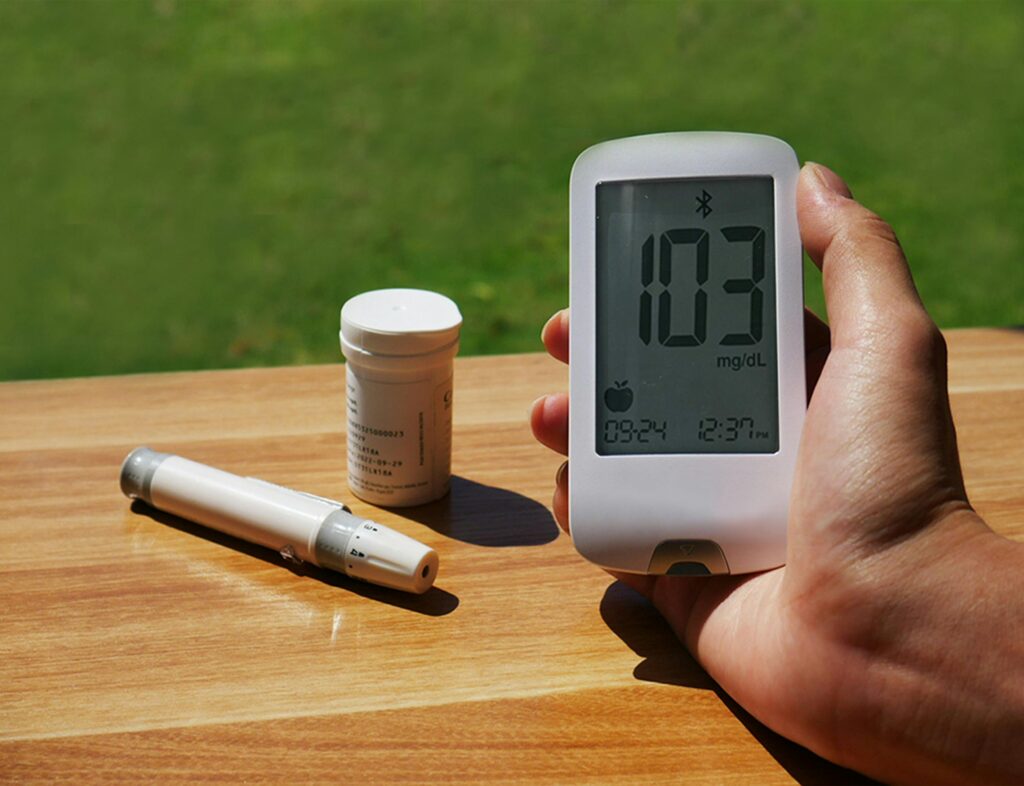Blood sugar, or blood glucose, is the amount of sugar circulating in your blood. Glucose is a key source of energy for the body, and its levels are controlled by insulin. Keeping blood sugar levels balanced is essential for good health, as both high and low blood sugar can cause various health issues.
Effectively managing blood sugar levels is essential for maintaining overall health, especially for individuals with diabetes or those at risk of developing it. Blood sugar levels and blood pressure are closely related. High or low blood sugar can lead to serious health complications, but with the right approach, you can keep your levels in a healthy range.
Table of Contents
How Can I Check My Blood Sugar Levels
To check your blood sugar levels, you can use a blood sugar meter (glucometer) or a continuous glucose monitor (CGM).
A blood sugar meter measures the sugar level in a small blood sample, typically from your fingertip. A CGM, on the other hand, uses a sensor placed under your skin to measure your blood sugar continuously throughout the day.
Even if you use a CGM, it’s important to still test your blood sugar daily with a meter to ensure the CGM readings are accurate.
When Should I Check My Blood Sugar levels
How often you check your blood sugar depends on your type of diabetes and whether you’re taking any diabetes medications.
Here are some ideal times to check your blood sugar:
- Upon waking up, before eating or drinking anything.
- Before meals.
- Two hours after meals.
- At bedtime.
If you have type 1 diabetes, type 2 diabetes and take insulin, or frequently experience low blood sugar, your doctor may recommend checking more often, such as before and after physical activity.
Your Blood Sugar Goals
Your blood sugar levels target is the range you’re aiming for to help manage your health. Common targets include:
- Before meals: 80 to 130 mg/dL
- Two hours after eating: Below 180 mg/dL
However, your personal targets may vary based on factors like your age, other health conditions, and individual circumstances. It’s important to discuss your specific targets with your healthcare team.
What Causes Low Blood Sugar
Blood sugar below 70 mg/dL is considered low, or hypoglycemia. There are some factors that can cause low blood sugar, following:
- Skipping meals
- Taking too much insulin
- Using other diabetes medications
- Increased physical activity
- Drinking alcohol
What Causes High Blood Sugar
High blood sugar, or hyperglycemia, can be caused by several factors, including:
- Illness
- Stress
- Eating more than usual
- Not taking enough insulin
If your blood sugar is 240 mg/dL or higher while you’re sick, use a ketone test kit to check for ketones. High ketones can signal diabetic ketoacidosis (DKA), a serious medical condition that requires immediate attention.
Effective Ways to Manage Your Blood Sugar levels
Managing your blood sugar is key to maintaining overall health. A healthy diet, regular physical activity, and maintaining a healthy weight can make a big difference. Here are some additional tips to help you manage your blood sugar effectively:
- Monitor your blood sugar regularly to understand what affects it.
- Maintain consistent meal times and avoid skipping any meals.
- Opt for foods that are lower in calories, saturated fats, sugars, and salt.
- Keep track of your food, drinks, and physical activity.
- Choose water over sugary beverages such as juice or soda.
- Limit alcohol consumption (no more than 2 drinks a day for men, and 1 drink a day for women).
- Satisfy your sweet cravings with fruit instead of sugary treats.
- Manage portion sizes, for example, using the plate method to help balance your meals.
- By following these steps, you can help keep your blood sugar levels under control and improve your overall health.

